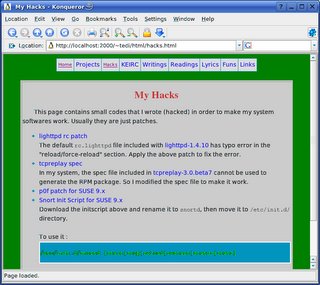Having Fun with PySQLite
I had a chance to test pysqlite, a Python wrapper for SQLite Database System. pysqlite needs the following dependencies :
- Operating System and C Compiler
- SQLite version 3.0.8 or later (for pysqlite 2.2.0)
- Python 2.3 or later
$ tar xvzpf pysqlite-2.2.2.tar.gz
pysqlite-2.2.2/
pysqlite-2.2.2/doc/
pysqlite-2.2.2/doc/code
...
pysqlite-2.2.2/setup.cfg
pysqlite-2.2.2/setup.py
pysqlite-2.2.2/PKG-INFO
$ cd pysqlite-2.2.2/
$ python setup.py build
running build
running build_py
creating build
creating build/lib.linux-i686-2.4
creating build/lib.linux-i686-2.4/pysqlite2
...
# python setup.py install
running install
running build
running build_py
running build_ext
running install_lib
...
In my system, the above command will install pysqlite to /usr/lib/python2.4/site-packages directory
Next I test whether the installation success or not :
$ python
Python 2.4 (#1, Mar 22 2005, 21:42:42)
[GCC 3.3.5 20050117 (prerelease) (SUSE Linux)] on linux2
Type "help", "copyright", "credits" or "license" for more information.
>>> from pysqlite2 import test
>>> test.test()
......................................................................
----------------------------------------------------------------------
Ran 164 tests in 1.060s
OK
>>>
Next I type several lines of Python code to test PySQLite. Here is the code. Please beware this is just a simple application :
#!/usr/bin/env python
from pysqlite2 import dbapi2 as sqlite
import os
DB_FILE = "mydb"
musics = [
("Michael W Smith", "In My Arms Again"),
("Chayanne", "Ye Te Amo"),
("Marc Anthony", "Everything You Do")
]
if os.path.exists(DB_FILE):
os.remove(DB_FILE)
con = sqlite.connect(DB_FILE)
# create table
con.execute("""
create table music
(
singer varchar(30),
song varchar(30)
)
""")
print "Success creating table",'"%s"' % DB_FILE
# insert table
con.executemany("insert into music(singer,song) values (?,?)", musics)
# print table contents
print "\nThe content of", DB_FILE
print "=" * 20,"\n"
for row in con.execute("select singer,song from music"):
print '%s : %s' % (row[0],row[1])
con.close()


